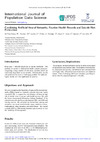Identificador persistente para citar o vincular este elemento:
https://accedacris.ulpgc.es/jspui/handle/10553/77835
| Título: | Combining Artificial Neural Networks, Routine Health Records and Suicide Risk Estimation | Autores/as: | Del Pozo Baños, Marcos Travieso González, Carlos Manuel Loxton, Kate Petkov, Nicolai Berridge, Damon Lloyd, Keith Jones, Caroline Spencer, Sarah John, Ann |
Clasificación UNESCO: | 3307 Tecnología electrónica | Fecha de publicación: | 2018 | Publicación seriada: | International Journal of Population Data Science | Resumen: | Information is increasingly digital, creating opportunities to respond to pressing issues about human populations in near real time using linked datasets that are large, complex, and diverse. The potential social and individual benefits that can come from data-intensive science are large, but raise challenges of balancing individual privacy and the public good, building appropriate socio-technical systems to support data-intensive science, and determining whether defining a new field of inquiry might help move those collective interests and activities forward. A combination of expert engagement, literature review, and iterative conversations led to our conclusion that defining the field of Population Data Science (challenge 3) will help address the other two challenges as well. We define Population Data Science succinctly as the science of data about people and note that it is related to but distinct from the fields of data science and informatics. A broader definition names four characteristics of: data use for positive impact on citizens and society; bringing together and analyzing data from multiple sources; finding population-level insights; and developing safe, privacy-sensitive and ethical infrastructure to support research. One implication of these characteristics is that few people possess all of the requisite knowledge and skills of Population Data Science, so this is by nature a multi-disciplinary field. Other implications include the need to advance various aspects of science, such as data linkage technology, various forms of analytics, and methods of public engagement. These implications are the beginnings of a research agenda for Population Data Science, which if approached as a collective field, can catalyze significant advances in our understanding of trends in society, health, and human behavior. | URI: | https://accedacris.ulpgc.es/handle/10553/77835 | ISSN: | 2399-4908 | DOI: | 10.23889/ijpds.v3i4.774 | Fuente: | International Journal of Population Data Science [ISSN 2399-4908], v. 3 (4) |
| Colección: | Artículos |
Visitas
97
actualizado el 10-ene-2026
Descargas
46
actualizado el 10-ene-2026
Google ScholarTM
Verifica
Altmetric
Comparte
Exporta metadatos
Los elementos en ULPGC accedaCRIS están protegidos por derechos de autor con todos los derechos reservados, a menos que se indique lo contrario.
